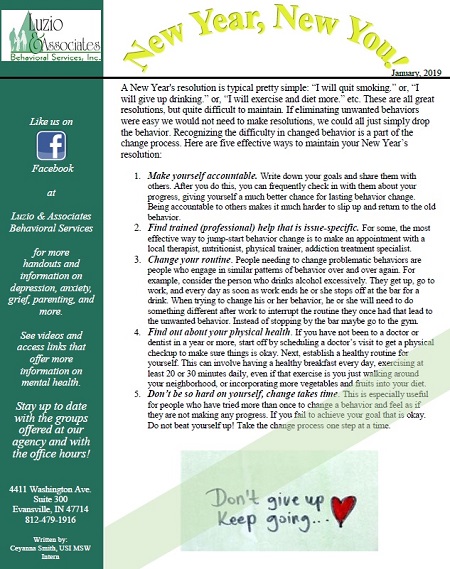A New Year’s resolution is typical pretty simple: “I will quit smoking.” or, “I will give up drinking.” or, “I will exercise and diet more.” etc. These are all great resolutions, but quite difficult to maintain. If eliminating unwanted behaviors were easy we would not need to make resolutions, we could all just simply drop the behavior. Recognizing the difficulty in changed behavior is a part of the change process. Here are five effective ways to maintain your New Year’s resolution:
- Make yourself accountable. Write down your goals and share them with others. After you do this, you can frequently check in with them about your progress, giving yourself a much better chance for lasting behavior change. Being accountable to others makes it much harder to slip up and return to the old behavior.
- Find trained (professional) help that is issue-specific. For some, the most effective way to jump-start behavior change is to make an appointment with a local therapist, nutritionist, physical trainer, addiction treatment specialist.
- Change your routine. People needing to change problematic behaviors are people who engage in similar patterns of behavior over and over again. For example, consider the person who drinks alcohol excessively. They get up, go to work, and every day as soon as work ends he or she stops off at the bar for a drink. When trying to change his or her behavior, he or she will need to do something different after work to interrupt the routine they once had that lead to the unwanted behavior. Instead of stopping by the bar maybe go to the gym.
- Find out about your physical health. If you have not been to a doctor or dentist in a year or more, start off by scheduling a doctor’s visit to get a physical checkup to make sure things is okay. Next, establish a healthy routine for yourself. This can involve having a healthy breakfast every day, exercising at least 20 or 30 minutes daily, even if that exercise is you just walking around your neighborhood, or incorporating more vegetables and fruits into your diet.
- Don’t be so hard on yourself, change takes time. This is especially useful for people who have tried more than once to change a behavior and feel as if they are not making any progress. If you fail to achieve your goal that is okay. Do not beat yourself up! Take the change process one step at a time.
